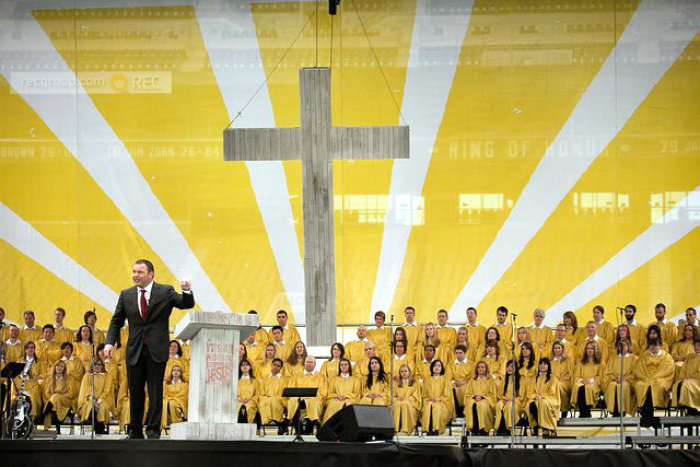Top 10 Most Discussed Issues Inside the Evangelical Church in 2014 (Interview With Ed Stetzer)
What were the most talked about topics discussed within the evangelical community in 2014? The Christian Post had a chance to chat with Ed Stetzer, author, speaker, and executive director of LifeWay Research Division and go over what issues seemed to gain the most attention among both pastors and congregations.
The following issues and topics are in no particular order.

1. LGBT inside church and ministries. When World Vision U.S. decided in March of 2014 to first, hire Christians in same-sex marriages and then, only two days later reverse its ground-breaking decision as the result of intense criticism from evangelical leaders, the conversation about gays within the Christian community increased in intensity.
"Rather than creating more unity [among Christians], we created more division, and that was not the intent," said World Vision U.S. President Richard Stearns shortly after reversing the decision. "Our board acknowledged that the policy change we made was a mistake … and we believe that [World Vision supporters] helped us to see that with more clarity … and we're asking you to forgive us for that mistake."
Stetzer said he believes that the World Vision story helped shape "a whole other conversation." He explained, "Before then it was a conversation in the culture, now it's a conversation within the evangelical church."
2. The Christian response to issues of race and law enforcement. As the result of the deaths of two black men during separate tragic incidents in Ferguson, Missouri, and New York, involving confrontations with police, evangelical leaders have become prominent voices in the conversation about race relations — especially coming after nationwide protests erupted about court decisions favoring police actions. Invariably, when the discussion arises, the question of how police in the U.S. handle related issues surrounding ethnic profiling also come up.
Again, Stetzer, who recently led a live webcast panel, "A Time to Talk," believes evangelical leaders can play a major part in elevating the discussion about finding solutions.
3. The year of the Christian film turned out to be disappointment because there were a lot of films out there that Christians didn't appreciate, Stetzer told CP. "The bright side is that there's an interest to engage the Christian market," he said.
"The Bible" TV series led to another Bible-related series, "A.D.," scheduled to air in 2015. The recognition that there's a substantial market for faith-based films "also led to a lot of stuff that wasn't very good," Stetzer said. "A lot of Hollywood films were disappointing to Christians because they didn't tell the story faithfully, and many Christian films were disappointing because they didn't tell the story well."
The movie, "Exodus," finished out the year leaving a bad taste for many Christians for its departure from the biblical story of Moses, and closed out the year in film for many Christians with a "low level" of enthusiasm.

4. Pastor Mark Driscoll's leadership, resignation, and the dissolving of Mars Hill Church led the news inside the evangelical world for much of the year. Stories that came to the forefront included questions about Driscoll's personal church management style and his ethics in regards to his own material.
"The issues with Driscoll became both a controversy and a focal point for this discussion," Stetzer said. "The collapse of Mars Hill … it's gone, it ceased to exist. The fact that we see the collapse of a multi-site megachurch is newsworthy for sure."
5. The fall of the celebrity pastors. The increased amount of stories about megachurch pastors dealing with moral issues and systematic issues within their own churches, led to "questions about the celebrity pastor model," Stetzer said. "But I think the healthy thing about what could come out of this is that it could lead to conversations about ecclesiology or how we can do church."
6. Rising discussion about Pentecostalism. "It seems that, although I don't have any statistical evidence, it seems that Cessationism (the idea that the spiritual gifts mentioned in the Bible have passed away) has become a less common of a belief for the next generation," Stetzer told CP. "There are really a lot of people open to Charismatics, but I think there are a lot of people that are still trying to figure it out. Although there's a debate in North America about it, it's the fastest growing movement in the world in the history of Christianity. So, while we are talking about it here, it's growing out there."
7. The pope's view on things. Pope Francis continues to make news often with both his orthodox and unorthodox view of both Catholicism and Christianity. Stetzer said the pope can sometimes delivers mixed and unclear messages and it is precisely why the secular world has embraced discussion about the pope.
"He has modeled kindness and winsomeness in a way that I think religious leaders are not generally known for," Stetzer observes. "He's certainly tried to reach out. The reformation still really matters. There are real issues that separate Protestant, particularly Evangelicals, from the pope. But he's certainly sought out to be a bridge builder. There's been a clear reaching out between Evangelicals and the pope, but I think it's important to note and remember that there are really important issues at stake for Protestants and their understanding of the Gospel and Scripture."
8. The shallowness of evangelical theology. "Ultimately, I think we are kind of in a drought of theology and we need the streams of living theology that are in the Word," Stetzer told CP. "We are in a theological malaise and I think part of it is what the Scriptures talk about, that people will naturally drift toward what will tickle their ears. In the post-modern world that we are in, biblical truth gets pushed to the side."
9. Next generation ministry. Beyond just reaching millennials, there's a broader generation of people that Christian leaders are concerned about. "People are asking how can we better retain the next generation? That's been a major topic of debate," Stetzer said.
10. What really is the state of the Church? "There's really no research that shows the Church is dying," Stetzer claims. "There is no researcher in the United States who thinks that. What's happening is that Mainline Protestantism is hemorrhaging and dying, evangelicalism is growing, although it peeked in the 1990s and there is a bit of an identity crisis now."
He adds, "Next year, I think Evangelicals need to be clearer on the Gospel and more focused on the mission. We are at a key moment in history and I think nominal Christianity is dying. The answer is biblical Christianity on mission."




























